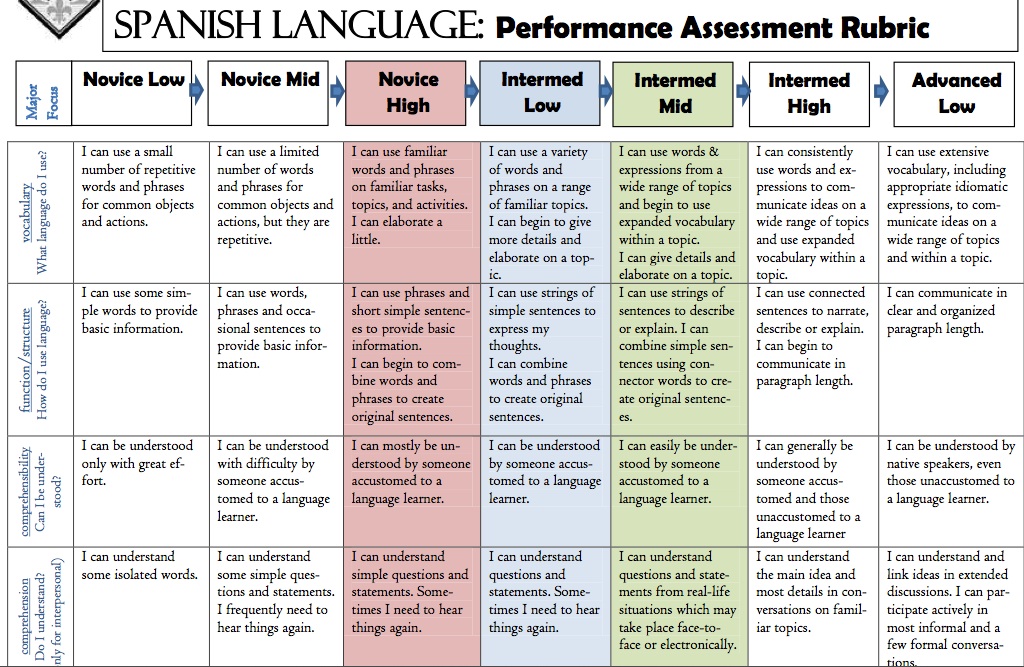The third and fourth most popular posts of 2015 were very close, but with the benefit of a few extra months the post on task completion on rubrics barely edged out the #4 post to take the bronze medal. I’m so glad I wondered about task completion and its importance in life and in rubrics in public here, because the feedback I got from this post was so informative for my rubric overhaul.
Rubrics: How important is task completion?
Forgive me while I brainstorm in public a moment.
 Almost four years ago I created this rubric, based on the ACTFL guidelines and the Jefferson County (KY) Public Schools’ world language rubric. I loved it. It’s one of my most requested resources. I used it for years. But as I wrap up my first year out of the classroom and prepare to embark on a new journey (teaching my own Spanish classes for homeschooled students and adult learners), I’ve been reflecting on the good and bad of my rubric and how to redesign it for my newest journey.
Almost four years ago I created this rubric, based on the ACTFL guidelines and the Jefferson County (KY) Public Schools’ world language rubric. I loved it. It’s one of my most requested resources. I used it for years. But as I wrap up my first year out of the classroom and prepare to embark on a new journey (teaching my own Spanish classes for homeschooled students and adult learners), I’ve been reflecting on the good and bad of my rubric and how to redesign it for my newest journey.
It’s not all the same
One of the things I like most about the rubric is also one of the things I like least: it separates a major focus from a minor focus. That resonates with me. Not all language use factors are created equal. Pronunciation in the sense of sounding like a native isn’t a goal or even possible for most learners. Pronunciation for comprehensibility – that is important. As language nerds teachers we love to nitpick about the verb endings and adjective agreement, but the fact is that the vast majority of the time, those mistakes do not impede communication. For my fourth-year students striving for Intermediate High, eliminating those patterns is a goal, but for my first-year novices, it’s just not. They just want to talk.
So what is it I don’t like? I always wondered why task completion was listed as a minor focus, almost in such a way that it would not affect the overall grade at all. I think I started wondering this as I used the rubric more and more to grade AP assessments, and finally exclusively teaching AP. In that class, task completion was a major focus for sure. Students couldn’t be very successful on a task if they responded in a way that did not address what they were asked to do. And as I intend to make my interpretive tasks look more and more like incorporating authentic resources into production tasks (e.g. tell whether or not you agree with the opinion in this meme), regardless of level, yeah, it matters to me. If you produce a whole bunch of pretty language on the AP but don’t cite a single one of the three sources they asked you to, you’re sunk. My rubric didn’t give me a good place to say that.
But I liked my rubric. Other people liked my rubric. Surely there wasn’t anything wrong with it. But I knew there was. And then Melanie reminded me there was.
 Is task completion part of life?
Is task completion part of life?
As I evaluate what to do with task completion on my rubric, I’m not sure I know what it’s going to look like. I can tell you it won’t be labeled “minor focus.” I can tell you what questions I’m asking myself.
- When someone asks me to do something that requires language, how important is it that I actually answer the question?
- If I ask a student a question, and they use great language to address something entirely different, how can I give credit for the language effort without letting them get away with avoiding the task?
- How much will task completion be a part of the life I’m supposed to be preparing my students for?
- How does the importance of task completion compare to the importance of the language used to complete it?
Rumblings of change
I do know that there are several things I want to keep and things I want to change about my rubric.
What I love:
- I must have my large feedback box to write anything I can think of to help the student reach his goal.
- I will still have everything I want on one rubric so I use the same one for every task I assess.
- Students will still know exactly where they are in regard to the expectation: approaching, meeting, or exceeding.
- The descriptions will still be full of proficiency-based terminology focused on successful communication.
What I’ll probably change:
- I don’t like the word “Unsatisfactory.” Looking for a new way to say, “You’ve gotta try this again before we move on.”
- Task completion needs a different spot not labeled “minor focus.” I will probably remove the term “minor focus” altogether. What other way can I indicate that not all language aspects are created equal?
- I don’t expect to teach students hitting Advanced Low language and most other teachers don’t either. So I’m kicking that one off to give me more space.
- I want to make the “language control” descriptions communicate more to the student (those last two on the right confusing, anyone?).
- I’d like to figure out how to make the rubric more interpersonal-friendly, since this is the mode most of my students actually want most.
As always, turning to the PLN
Isn’t our online community of language teachers fantastic? I can tell you to whom I’ll be turning for input on my new rubric:
- Amy’s and Colleen’s rubrics will really help inform my changes to the interpersonal aspect.
- I can’t wait to delve farther into the Ohio documents.
- Bethanie’s rubric will help me communicate better feedback to students.
- The ACTFL proficiency language in Martina’s rubrics will help me keep that focus.
Maybe I’ll even have my new rubric developed in time to share with the teachers at the Camp Musicuentos workshops. I’ve always worked better with deadlines!




